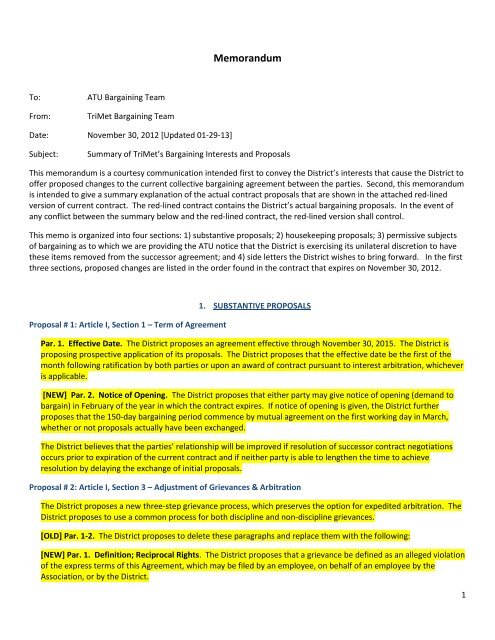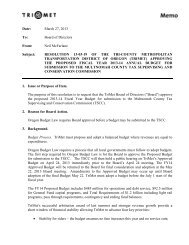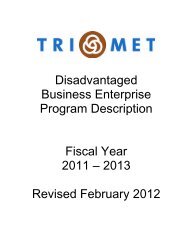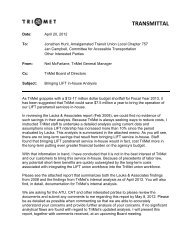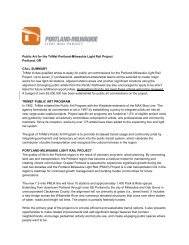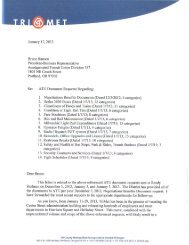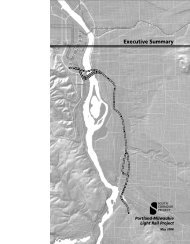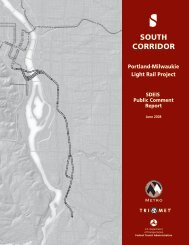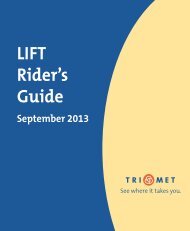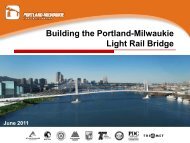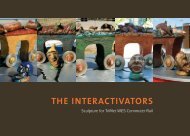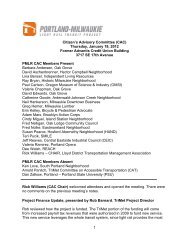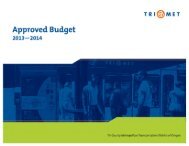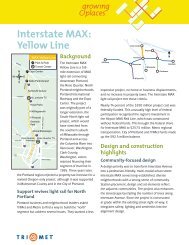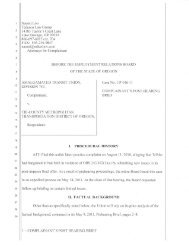Cover letter: Summary of TriMet's Bargaining Interests and Proposals
Cover letter: Summary of TriMet's Bargaining Interests and Proposals
Cover letter: Summary of TriMet's Bargaining Interests and Proposals
Create successful ePaper yourself
Turn your PDF publications into a flip-book with our unique Google optimized e-Paper software.
Memor<strong>and</strong>um<br />
To:<br />
From:<br />
ATU <strong>Bargaining</strong> Team<br />
TriMet <strong>Bargaining</strong> Team<br />
Date: November 30, 2012 [Updated 01-29-13]<br />
Subject:<br />
<strong>Summary</strong> <strong>of</strong> TriMet’s <strong>Bargaining</strong> <strong>Interests</strong> <strong>and</strong> <strong>Proposals</strong><br />
This memor<strong>and</strong>um is a courtesy communication intended first to convey the District’s interests that cause the District to<br />
<strong>of</strong>fer proposed changes to the current collective bargaining agreement between the parties. Second, this memor<strong>and</strong>um<br />
is intended to give a summary explanation <strong>of</strong> the actual contract proposals that are shown in the attached red-lined<br />
version <strong>of</strong> current contract. The red-lined contract contains the District’s actual bargaining proposals. In the event <strong>of</strong><br />
any conflict between the summary below <strong>and</strong> the red-lined contract, the red-lined version shall control.<br />
This memo is organized into four sections: 1) substantive proposals; 2) housekeeping proposals; 3) permissive subjects<br />
<strong>of</strong> bargaining as to which we are providing the ATU notice that the District is exercising its unilateral discretion to have<br />
these items removed from the successor agreement; <strong>and</strong> 4) side <strong>letter</strong>s the District wishes to bring forward. In the first<br />
three sections, proposed changes are listed in the order found in the contract that expires on November 30, 2012.<br />
Proposal # 1: Article I, Section 1 – Term <strong>of</strong> Agreement<br />
1. SUBSTANTIVE PROPOSALS<br />
Par. 1. Effective Date. The District proposes an agreement effective through November 30, 2015. The District is<br />
proposing prospective application <strong>of</strong> its proposals. The District proposes that the effective date be the first <strong>of</strong> the<br />
month following ratification by both parties or upon an award <strong>of</strong> contract pursuant to interest arbitration, whichever<br />
is applicable.<br />
[NEW] Par. 2. Notice <strong>of</strong> Opening. The District proposes that either party may give notice <strong>of</strong> opening (dem<strong>and</strong> to<br />
bargain) in February <strong>of</strong> the year in which the contract expires. If notice <strong>of</strong> opening is given, the District further<br />
proposes that the 150-day bargaining period commence by mutual agreement on the first working day in March,<br />
whether or not proposals actually have been exchanged.<br />
The District believes that the parties’ relationship will be improved if resolution <strong>of</strong> successor contract negotiations<br />
occurs prior to expiration <strong>of</strong> the current contract <strong>and</strong> if neither party is able to lengthen the time to achieve<br />
resolution by delaying the exchange <strong>of</strong> initial proposals.<br />
Proposal # 2: Article I, Section 3 – Adjustment <strong>of</strong> Grievances & Arbitration<br />
The District proposes a new three-step grievance process, which preserves the option for expedited arbitration. The<br />
District proposes to use a common process for both discipline <strong>and</strong> non-discipline grievances.<br />
[OLD] Par. 1-2. The District proposes to delete these paragraphs <strong>and</strong> replace them with the following:<br />
[NEW] Par. 1. Definition; Reciprocal Rights. The District proposes that a grievance be defined as an alleged violation<br />
<strong>of</strong> the express terms <strong>of</strong> this Agreement, which may be filed by an employee, on behalf <strong>of</strong> an employee by the<br />
Association, or by the District.<br />
1
[NEW] Par. 2. Association; Disciplinary Grievances . The District proposes that we use a common process for both<br />
discipline <strong>and</strong> non-discipline grievances, but that disciplinary grievances <strong>and</strong> grievances filed by the Association on<br />
behalf <strong>of</strong> an employee (<strong>and</strong>, reciprocally, those filed by the District), start at Step 2.<br />
[NEW] Par. 3. Grievance Steps. The District proposes three steps in the grievance process, a new grievance form,<br />
<strong>and</strong> elimination <strong>of</strong> “binding” panel decisions, which the Association has refused to recognize as binding.<br />
The District believes it is time to revise the grievance process due to the extraordinary number <strong>of</strong> grievances filed<br />
each year by the Association <strong>and</strong> its members when considered together with the very small percentage <strong>of</strong><br />
grievances sustained after arbitration; the excessive drain on District resources to process the number <strong>of</strong> grievances<br />
files; the lack <strong>of</strong> acknowledgement by the ATU <strong>of</strong> a reciprocal right <strong>of</strong> the District to grieve contract violations by the<br />
ATU violation <strong>of</strong> the contract; refusal by the ATU to utilize a grievance form that adequately gives the District notice<br />
as to which provisions <strong>of</strong> the Agreement are being grieved; <strong>and</strong> the ATU’s insistence upon moving grievances to<br />
arbitration despite clarity in the contract that the Step III Grievance Panel’s decision is binding, yet refusing to give<br />
the District a similar right.<br />
[NEW] Par 4. Limitations. The District proposes that only grievances related to discipline or an alleged violation <strong>of</strong> a<br />
provision <strong>of</strong> this Agreement be submitted to arbitration <strong>and</strong> that the arbitrator have no power to add to, subtract<br />
from, or change, modify or amend any <strong>of</strong> the terms or provisions <strong>of</strong> this Agreement.<br />
[NEW] Par. 8. Mid-Term <strong>Bargaining</strong>. The District proposes that the parties “zip up” the contract to avoid additional<br />
mid-term collective bargaining, except as otherwise mutually agreed by the parties.<br />
The District’s financial condition is perilous. Consequently, the parties’ relationship has become tumultuous. The<br />
District believes the parties would benefit by mid-term stability <strong>and</strong> predictability as to m<strong>and</strong>atory subjects <strong>of</strong><br />
bargaining.<br />
Proposal # 3: Article I, Section 4 – Discipline<br />
Par. 1. The District proposes the parties define discipline to include Warning Letters, Letters <strong>of</strong> Reprim<strong>and</strong>,<br />
Demotion, <strong>and</strong> Suspension <strong>and</strong> Discharge (excepting that the District may enter into a last chance agreement in lieu<br />
<strong>of</strong> Discharge). The District also proposes the parties acknowledge Counseling Letters <strong>and</strong> Letters <strong>of</strong> Expectation are<br />
not disciplinary <strong>and</strong> may not be grieved. The District further proposes that pre-discipline representation <strong>of</strong> an<br />
employee not be at the District’s expense.<br />
Par. 6. The District proposes the same grievance process be used for grieving discipline as for other grievances.<br />
Under the District’s proposal, disciplinary grievances begin at Step 2. The District believes there is no need for a<br />
separate process.<br />
Proposal # 4: Article I, Section 7 – Vacations<br />
Par. 3(i). The District proposes a “ten over base” formula for determining additional weeks <strong>of</strong> vacation during the<br />
summer.<br />
Due to the large number <strong>of</strong> staff reductions in recent years, 65 additional vacation weeks is too many.<br />
Par. 3(o). Under both FMLA <strong>and</strong> OFLA, the employer may require employees to take concurrent paid leave in a<br />
specified order. Consequently, the District will require that sick leave be taken first.<br />
Proposal # 5: Article I, Section 9 – Health & Welfare Benefits<br />
2
Par. 1. Medical, Hospital, Prescription Drug, Dental, <strong>and</strong> Vision.<br />
Par. 1(a). Medical, Hospital, Prescription Drug, Dental, <strong>and</strong> Vision. Subject to other proposed changes below,<br />
the District proposes that the District pay 94% <strong>of</strong> the premium cost for each tier <strong>of</strong> coverage: single, single + 1,<br />
single + children, <strong>and</strong> family coverage. The District further proposes that insurance plans <strong>of</strong>fered to association<br />
members be the same Regence <strong>and</strong> Kaiser plans (with the same employee deductibles, co-pays, <strong>and</strong> out-<strong>of</strong>pockets<br />
expenses) as <strong>of</strong>fered to non-union employees as <strong>of</strong> November 30, 2012 (see plan summaries attached to<br />
the contract). In order to comply with existing insurance contract requirements, if an active employee or their<br />
eligible dependent(s) become Medicare eligible for any reason, including disability, the member must enroll in<br />
<strong>and</strong> maintain Medicare parts A & B insurance coverage as soon as they become Medicare eligible. In such cases,<br />
TriMet shall reimburse the employee the actual costs <strong>of</strong> the Medicare B monthly premium for the member<br />
enrolled in Medicare. Finally, the District proposes to change the title <strong>of</strong> the paragraph to reflect modern<br />
terminology regarding lines <strong>of</strong> coverage.<br />
As described by Arbitrator Gaba, active <strong>and</strong> retiree healthcare costs continue to be the “two-headed Siamese twin<br />
elephant” in the room that, unless acknowledged <strong>and</strong> addressed, eventually will result in TriMet’s insolvency.<br />
Should that occur, the impact to employees <strong>and</strong> retirees no doubt would be similar to the situations now being<br />
experienced by employees in City <strong>of</strong> Vallejo, San Bernardino, Mammoth Lakes, <strong>and</strong> other California cities.<br />
TriMet’s unfunded OPEB liability, now over $900 million, is growing rapidly. Moreover, TriMet’s share <strong>of</strong><br />
providing active employee health care under the Regence plan is over 50% higher than coverage provided by our<br />
peer transit agencies to their represented employees. Even the Regence 90/10 plan implemented September 1,<br />
2012, pursuant to the interest arbitration award is a gold-plated, Cadillac plan. The Patient Protection <strong>and</strong><br />
Affordable Care Act defines “Cadillac plans” <strong>and</strong> it imposes an excise tax for health plans that will exceed a<br />
premium cost <strong>of</strong> $10,200 for individual coverage <strong>and</strong> $27,500 for family coverage in 2018. The tax is equal to 40%<br />
<strong>of</strong> plan value that exceeds the threshold amounts. The union PPO plan already exceeds these thresholds. Based<br />
upon the initial premiums quote, we expect the 2013 Regence 90/10 individual premium to be $10,823 <strong>and</strong> family<br />
coverage to be $30,659. That does not include dental, nor does it account for premium escalation between now<br />
<strong>and</strong> 2018. We expect the excise tax will cost TriMet between $6 <strong>and</strong> $7 million in 2018, which we cannot afford.<br />
TriMet believes there is a great benefit to having all employees on the same healthcare plan <strong>and</strong> contributing the<br />
same amount toward coverage. The same plan means management <strong>and</strong> labor’s interests are aligned. TriMet also<br />
believes this is fair considering that the average wage <strong>of</strong> TriMet’s non-union employees, including wages <strong>of</strong><br />
executives, is only about $10,000 a year more than the average <strong>of</strong> union employees, <strong>and</strong> that union employees<br />
disproportionately utilize healthcare benefits.<br />
The District does not carry separate “convalescence” coverage; this is outdated terminology. Similarly, “optical”<br />
coverage now is referred to as “vision” coverage. The same change to terminology has been made to Article II,<br />
Section 2 , Par. 9.<br />
Par. 1(c)-[NEW](e). The District proposes that employees hired between February 1, 1992, through November 30,<br />
2012, <strong>and</strong> those who have met the 10-year requirement for retirement prior to the effective date <strong>of</strong> this<br />
agreement shall receive the same health <strong>and</strong> welfare benefits available to active employees. The District also<br />
proposes that employees who meet the 10-year requirement on or after the effective date <strong>of</strong> the agreement will<br />
be eligible upon retirement for single coverage until age 65 with the District paying 50% <strong>of</strong> the cost. As <strong>of</strong><br />
September 9, 2012, 62% <strong>of</strong> active union members meet the 10-year requirement <strong>and</strong> so would not be affected by<br />
this proposal.<br />
The District also proposes that employees <strong>and</strong> dependents must enroll in Medicare insurance when they are<br />
eligible for any reason, including disability.<br />
3
Par. 1(f) Mini-Run Operator <strong>Cover</strong>age & Article II, Section 2, Par. 9. The District proposes that the District pay<br />
90% <strong>of</strong> the premium cost for each tier <strong>of</strong> coverage: single, single + 1, single + children, <strong>and</strong> family coverage under<br />
the 80/20 Regence <strong>and</strong> Kaiser plans <strong>of</strong>fered to non-union employees as <strong>of</strong> November 30, 2012 (see plan summary<br />
attached to the contract). The District also proposes that this formula apply to MRO employees in training for<br />
light rail.<br />
The parties’ current practice does not follow the current language <strong>of</strong> paying 100% for the employee + “75% <strong>of</strong> the<br />
family premium cost.” The awkwardness <strong>of</strong> the language is susceptible to multiple interpretations. In actuality, if<br />
a MRO employee has any dependents, they pay about 13% <strong>of</strong> a composite rate under the predecessor contract.<br />
Par. [NEW] 1(g). Dual coverage; Waiver <strong>of</strong> <strong>Cover</strong>age. The District proposes to allow employees or retirees to<br />
waive coverage upon hire or during open enrollment if they can certify medical coverage under another medical<br />
plan, including Medicare. Employees or retirees who waive eligible coverage shall receive $250 monthly as<br />
taxable income, as appropriate. The District also proposes to eliminate dual coverage <strong>of</strong> active employees, or<br />
their dependents <strong>and</strong> thus, by extension, retirees.<br />
Employees, particularly MRO employees, may wish to decline our benefit coverage because, as part-time<br />
employees, they may find coverage is too expensive. Because waiving coverage saves the District money, it is<br />
willing to pay an incentive <strong>of</strong> $250 monthly. Should an employee or retiree lose coverage under another plan<br />
sponsor, they must inform the District <strong>and</strong> will no longer qualify for the incentive. They will be allowed to reenroll<br />
in the District’s plans for which they are eligible.<br />
Currently, non-union employees can waive coverage, <strong>and</strong> we are proposing to align the medical benefits <strong>of</strong> union<br />
<strong>and</strong> non-union employees. There is a significant amount <strong>of</strong> dual coverage at TriMet, particularly where a husb<strong>and</strong><br />
<strong>and</strong> wife are both covered individually. Dual coverage is costly, whether in a fully insured or self-insured<br />
environment. The cost <strong>of</strong> dual coverage comes largely from three areas: 1) premiums; fixed fees such as<br />
administration <strong>and</strong> stop loss (self-insured); <strong>and</strong> 3) deductibles.<br />
Par. [NEW] 1(h). Benefits Eligibility Hours Requirement (“BEHR”). The District proposes to implement a<br />
quarterly requirement <strong>of</strong> 240 hours (144 hours for MRO) comprised <strong>of</strong> all paid hours <strong>and</strong> all unpaid hours while<br />
on statutory leave in order to continue employee eligibility for healthcare coverage <strong>and</strong> the District’s contribution<br />
to such coverage.<br />
Currently, employees can be <strong>of</strong>f work for a year without being on protected leave <strong>and</strong> still receive all their<br />
benefits with premiums paid in full by TriMet. Under this proposal, if an employee fails to meet the required<br />
hours, s/he will lose coverage at the end <strong>of</strong> the quarter. Once the employee again meets the quarterly hours<br />
requirement, coverage will be reinstated at the beginning <strong>of</strong> the following quarter. The employee will be eligible<br />
for COBRA coverage at the employee’s expense while ineligible for employee coverage.<br />
[OLD] Par. 2. Benefits Coordinator. The District proposes no longer to pay the union to retain a Benefits<br />
Coordinator. The District has sufficient benefits personnel to answer questions regarding all benefits it <strong>of</strong>fers to<br />
employees, making this is an unnecessary expense.<br />
The District pays $1,500 a month to the Association for this position. Evidence in the 2012 interest arbitration<br />
established that the Associations pays a retainer <strong>of</strong> $900 a month in part to obtain benefits consulting expertise<br />
under this contract provision.<br />
In addition, upon information <strong>and</strong> belief, the Association has used the funds for the Benefits Coordinator in a manner<br />
that is illegal under PECBA <strong>and</strong> the Oregon Constitution. At the interest arbitration, the evidence introduced was that<br />
the Association has used the Benefits Coordinator to obtain technical expertise for purposes <strong>of</strong> evaluating the<br />
District’s benefits proposals <strong>and</strong> testifying in opposition to the District’s Last Best Offer. Using the District-funded<br />
4
union Benefits Coordinator in this manner means the District is paying the Association to provide testimony against<br />
the District’s interest. This violates PECBA <strong>and</strong> the State <strong>of</strong> Oregon Constitution because it constitutes impermissible<br />
assistance in the “formation, existence, or administration” <strong>of</strong> the union under ORS 243.672(1)(b). City <strong>of</strong> Portl<strong>and</strong>, 8<br />
PECBR 8115, 8121 (1985). This provision also violates the Oregon Constitution because public funds must be<br />
expended for a public purpose. See Carruthers v. Port <strong>of</strong> Astoria, 249 Or. 392 (1968). The District cannot expend<br />
funds to underwrite the ATU obtaining consulting expertise used by the ATU to further its own interests at the<br />
expense <strong>of</strong> the District’s interests.<br />
Proposal # 6: Article I, Section 15 – Safety <strong>and</strong> Health<br />
Section Heading & Par. 2. The District proposes to clarify the section heading by adding “& Health.” The District also<br />
proposes to add the word “vocational” in Par. 2 for purposes <strong>of</strong> clarification.<br />
[NEW] Par. 3. Hours <strong>of</strong> Service Policy <strong>and</strong> Procedures<br />
Par. 3(a)-(c). The District proposes to incorporate the April 2000 Hours <strong>of</strong> Service MOU into the body <strong>of</strong> the<br />
collective bargaining agreement.<br />
Par. 3(b). The District proposes to add Track Maintainer to the list <strong>of</strong> job classifications affected.<br />
Par. 3 (c). The District proposes to limit the number <strong>of</strong> hours a safety sensitive employee may work within a<br />
service day. The District is proposes to move to 10 consecutive hours <strong>of</strong> rest from seven (also applies to Par. 3(d))<br />
<strong>and</strong> define the seven-day period as a rolling seven-day period. The District also proposes to associate<br />
unnumbered text with sub-paragraph (5).<br />
Par. 3(d). The District proposes to incorporate ODOT’s definition <strong>of</strong> a 24-hour day under OAR 741-060-0020<br />
pursuant to the District’s notice to employees dated October 31, 2011. The District is proposes to move to 10<br />
consecutive hours <strong>of</strong> rest from seven (also applies to Par. 3(c)(1).<br />
Par. 3(e). The District proposes that the on-duty Station Agent be responsible for ensuring compliance with Hours<br />
<strong>of</strong> Service limitations.<br />
Par. 3(f). The District proposes that the Hours-<strong>of</strong>-Service requirements may be waived by the Executive Director<br />
<strong>of</strong> Operations in emergency situations.<br />
Par. 3(g). The District proposes to incorporate into the agreement the substance <strong>of</strong> communication to ATU from<br />
WES Director Jeff Lowe on August 18, 2008, that Commuter Rail Vehicle Maintenance Technicians <strong>and</strong> Assistant<br />
Supervisors are subject to Federal Railroad Administration (FRA) Hours-<strong>of</strong>-Service regulations.<br />
Par. 3(h). The District proposes that the parties acknowledge that Par. 3 is subject to FRA <strong>and</strong>/or FTA regulations,<br />
which may compel changes to Hours <strong>of</strong> Service requirements.<br />
Proposal # 7: Article I, Section 19 – Other Provisions<br />
[NEW] Par. 10(b). Child Care/Elder Assistance Program. The District proposes to continue making annual payments<br />
<strong>of</strong> $55,000 annually, but only when the balance is $100,000 or less on the date a payment is due. As <strong>of</strong> March 31,<br />
2012, the balance <strong>of</strong> the fund was in excess <strong>of</strong> $400,000.<br />
Proposal # 8: Article I, [NEW] Section 20 – Emergency Operations<br />
The District proposes to add a new section in the agreement that incorporates the Emergency Operations side <strong>letter</strong>.<br />
The District also proposes to delete the requirement that the District <strong>and</strong> the Association jointly develop <strong>and</strong> agree in<br />
5
writing on operating protocols prior to implementation in an emergency. The nature <strong>of</strong> emergency responses make<br />
the type <strong>of</strong> collaboration described impractical <strong>and</strong> puts public safety at risk.<br />
Proposal # 9: Article II, Section 1 – Operators<br />
Par. 1. General.<br />
Par. 1(c). The District proposes to increase from 5% to 10% the number <strong>of</strong> straight runs involving the Operator<br />
changing vehicles on Sunday in order to provide greater operating efficiency.<br />
Par. 1(m). The District proposes to eliminate Operators trading <strong>and</strong> signing into pass-up situations in order to<br />
ensure it has sufficient Operators available to provide scheduled service.<br />
Par. 5. Overtime.<br />
[NEW] Par. 5(g). The District proposes to make m<strong>and</strong>atory the current voluntary practice <strong>of</strong> having Operators attend<br />
8 hours <strong>of</strong> training annually on their regular day <strong>of</strong>f, which would be paid at their regular overtime rate.<br />
Par. 6. Off Duty.<br />
Par. 6(f). The District proposes to change the minimum number <strong>of</strong> available openings at each facility to a 1<br />
opening per 50 Operator formula for registering to be <strong>of</strong>f duty. The existing fixed number <strong>of</strong> opening is<br />
impractical in light <strong>of</strong> reduced services that have occurred in recent years.<br />
Par. 9 Other Provisions.<br />
Par. 9(a). The District proposes to delete references to vehicles that do not require the same type <strong>of</strong> training that<br />
is required to operate vehicles involved in the District’s core business.<br />
Par. 10. Extra Board Rules.<br />
Assigning Work (6). The District proposes to clarify that “specials” <strong>and</strong> “extras” are accorded the same treatment.<br />
Report Operators (11). The District proposes that the next report Operator up for work that has been cut <strong>of</strong>f in<br />
the a.m., will be brought back first as opposed to specifying that they will be brought in by 11:00 a.m. The District<br />
also proposes to correct awkward language in this provision.<br />
Report Operators (13). The District proposes to simplify the provision by having reporting Operators receive<br />
actual time in all situations rather than units <strong>of</strong> time, which is less accurate.<br />
Pass-Ups [NEW] (23). This is the same change as proposed for Art. II, Section 1, Par. 1(m) precluding Operators<br />
from signing in to a “pass up” situation.<br />
Penalties (29). The District proposes to clarify existing language that changes to assignments to comply with<br />
hours <strong>of</strong> service requirements are not to be considered as error.<br />
General (34). The District proposes that the phrase “at least” be added to properly convey the parties’ intent<br />
regarding how far in advance an Operator must call in before being penalized for a road relief or a garage sign-up.<br />
General [OLD] (38). The District proposes to delete obsolete language regarding special consideration given to<br />
Extra Station Agents, Extra Supervisors, <strong>and</strong> Bus Operators when assigned to any overtime.<br />
6
General [NEW] (51). The District proposes to move the first sentence <strong>of</strong> Article II, Section 9, Par. 11 to item 51 as<br />
an additional Extra Board rule <strong>and</strong> to clarify the use <strong>of</strong> operators sent out as extra service to fill open work is<br />
according to existing practices.<br />
Par. 11. Extra Service.<br />
[OLD] Par. 11(a). The District proposes to delete this provision <strong>and</strong> move it to a new Par. 10, General (51), with<br />
the clarification as stated therein.<br />
[NEW] Par. 11. The District proposes that Operators working extra service shall receive an 8-hour guarantee <strong>and</strong><br />
will be relieved at the District's discretion.<br />
Proposal # 10: Article II, Section 3 – Station Agents/Clerks<br />
Par. 5. The District proposes to fill the Chief Station Agent by selection rather than by sign-up. This classification is<br />
the only Operations Division “lead” position that is filled by seniority rather than by selection/appointment.<br />
Proposal # 11: Article II, [NEW] Section 9 – Attendance/Time Loss – Transportation<br />
The District proposes to add a new section relating to attendance/time loss provision that aligns with the<br />
Maintenance Department’s attendance/time loss policies. The District also proposes to delete Side Letter – Time<br />
Loss Notification.<br />
This proposal lowers the Step 1 counseling threshold from 90 hours to 40 hours (55 to 24 for PTOs) <strong>and</strong> lowers the<br />
Step 2 warning <strong>letter</strong> threshold from 110 hours to 64 hours (70 to 38 for PTOs). In addition, because the District is<br />
proposing to incorporate this issue into the main body <strong>of</strong> the agreement, the Side Letter regarding Time Loss<br />
Notification is no longer needed.<br />
Proposal # 12: Article III, Section 2 – Filling <strong>of</strong> Positions<br />
Par. 8(a)-(h). Assistant Supervisor. The District proposes to consolidate language related to Assistant Supervisors,<br />
making the provision applicable to Bus, Rail, <strong>and</strong> Facilities Assistant Supervisor provisions. The District also proposes<br />
to change the assistant supervisor premium from 115% to 110% <strong>of</strong> the journey worker rate for employees who<br />
become assistant supervisor on or after the effective date <strong>of</strong> this agreement. The District also proposes that<br />
Assistant Supervisors perform journey-level work in addition to their Assistant Supervisor duties without any caveat,<br />
making clear they are working supervisors.<br />
Par. 9. Service Worker. The District proposes to eliminate Service Worker premium pay for job functions within the<br />
helper classification.<br />
This relates to settlement <strong>of</strong> grievance #6184. The intent behind creating the Service Worker classification was to<br />
lower the cost for employees hired after July 1, 2004. This was to be accomplished by a lower wage <strong>and</strong> no premium<br />
pay.<br />
Proposal # 13: Article III, Section 5 – Allowances<br />
Par. 3. For new hires after the contract’s effective date, the District proposes to purchase a full set <strong>of</strong> tools for the<br />
apprentices <strong>and</strong> provisional Journeyworkers.<br />
The District does not believe employees should have to purchase a full set <strong>of</strong> tools, which can cost in excess <strong>of</strong><br />
$6,000. Under this proposal, ownership <strong>of</strong> the tools would transfer to the employee once the employee completes<br />
the training program. Consequently, such employees would not receive an hourly tool allowance.<br />
7
Par. 4. The District proposes to provide an overalls allowance in the same manner as it provides the uniform<br />
allowance to Transportation employees, pursuant to Article II, Section 7.<br />
Par. 5. The District proposes to provide the same allowance to Journeyworkers who train Provisional Journeyworkers<br />
as it does for training Apprentices.<br />
Proposal # 14 Article III, [OLD] Section 6 – Night Shifts<br />
Par. 1-2. The District proposes to eliminate pay differentials <strong>and</strong> paid lunches for night shifts.<br />
Proposal # 15: Article III, [NEW] Section 6 – Maintenance Journeyworker Classifications<br />
The District proposes to add a new section to the Agreement related to Journeyworker classifications in the<br />
Maintenance Department.<br />
Par. 1. The District proposes that this section will apply to Bus, Light Rail, <strong>and</strong> Facilities Maintenance departments.<br />
Par. 2. The District proposes that there be 10 journey level classifications, including “A” <strong>and</strong> “B” Bus <strong>and</strong> LRV<br />
Mechanics.<br />
Par. 3. The District proposes to “gr<strong>and</strong>father” existing Journeyworkers to the “A” classification.<br />
Par. 4. The District proposes “B” Mechanic classifications primarily will perform preventive maintenance inspections<br />
<strong>and</strong> perform vehicle adjustments, servicing <strong>and</strong> repairs within the scope <strong>of</strong> their “B” Mechanic training.<br />
Par. 5. The District proposes that the number <strong>of</strong> “B” Mechanics be less than the number <strong>of</strong> “A” Mechanics.<br />
Par. 6. The District proposes that the “B” Mechanics be eligible for the tool <strong>and</strong> longevity allowances <strong>and</strong> that there<br />
be no bidding back <strong>and</strong> forth between the “A” <strong>and</strong> “B” classifications.<br />
Par. 7. The District proposes to fill Journeyworkers in Maintenance from either the ranks <strong>of</strong> Provisional<br />
Journeyworkers or from the ranks <strong>of</strong> Apprentices, except for Light Rail Track Maintainer positions, which will be filled<br />
only by Trainees who complete a District Light Rail Track Maintainer Trainee program.<br />
Par. 8. The District proposes a consolidated Mechanic seniority provision that applies to all Journeyworker<br />
classifications. In addition, the District proposes to change from 6 months to 3 months the Article III, Section 15, Par.<br />
8 provision giving Trainees <strong>and</strong> Apprentices the right to return to their previous classification without loss <strong>of</strong><br />
seniority.<br />
Par. 9. The District proposes that it may conduct cross training for employees in light rail maintenance functions.<br />
Proposal # 16: Article III, [NEW] Section 7 – Provisional Journeyworker Programs<br />
Section 7, Par. 1-7. The District proposes to add a new section to the Agreement related to the direct hire <strong>of</strong><br />
Provisional Journeyworkers from outside the District in a manner similar to other transit agencies.<br />
In addition to the benefits <strong>of</strong> acquiring skilled craft personnel previously unavailable to the District because <strong>of</strong> past<br />
practices, such hires will help reduce OPEB costs because they will be eligible for less generous retiree health benefits<br />
than provided to currently active employees. They also will participate in the slightly less costly, but fully funded,<br />
defined contribution plan implemented August 1, 2012.<br />
8
Proposal # 17: Article III, [NEW] Section 8 – Mechanic Apprenticeship Program<br />
Par. 1-5. The District proposes new language regarding the Mechanic Apprenticeship Program, including a new<br />
section title <strong>and</strong> consolidation <strong>of</strong> program provisions. The District also proposes that Journeyworkers may not enter<br />
a new apprentice program until after 10 years as a Journeyworker in their existing craft. The District also proposes<br />
application tests be changed to qualification tests about acquired knowledge from aptitude tests. The District further<br />
proposes that employees on time loss or on discipline status not be eligible for the apprenticeship program.<br />
Proposal # 18: Article III, Section 10 – Maintenance Department Assistance Fund; Warranty Work<br />
Par. 1. The District proposes to simplify <strong>and</strong> consolidate the Maintenance Department contracting out provisions<br />
<strong>and</strong> warranty work provisions <strong>and</strong> clarify that the section applies to Bus Maintenance, Rail Equipment Maintenance,<br />
<strong>and</strong> Rail Maintenance <strong>of</strong> Way operations.<br />
Par. 2. The new language proposed is pursuant to the November 21, 1996 pre-arbitration agreement.<br />
[NEW] Par. 3. The District proposes to streamline the language to state simply that employees will not be laid <strong>of</strong>f<br />
solely as a result <strong>of</strong> contracting out work.<br />
[NEW] Par. 4. Warranty Work. The District proposes that warranty work will be done by District employees when<br />
qualified, unless work performed by District mechanics violates the vendor warranty.<br />
This proposal reflects established practice.<br />
Proposal # 19: Article III, [OLD] Section 11 <strong>and</strong> [OLD] 12– LRT Maintenance Vehicle Mechanics’ Training; LRT Vehicle<br />
Mechanics’ Seniority<br />
[OLD] Section 11, Par. 1-3; Section [OLD] 12, Par. 1. The District proposes to delete these paragraphs because these<br />
provisions are incorporated into proposed new Article III, Sections 6-8. The District also proposes to delete old<br />
Section 12, which is incorporated into proposed new Article III, Section 6, Par. 8.<br />
Proposal # 20: Article III, [NEW] Section 13 – Operation <strong>of</strong> LRVs by Engineers <strong>and</strong>/or Mechanics<br />
Par. 1-7. The District proposes to delete most <strong>of</strong> Pars. 1-7, which are now incorporated into new Article III, Section<br />
10, Par. 4. The District proposes to rename the heading since the remaining language relates to Operation <strong>of</strong> LRVs by<br />
Engineers <strong>and</strong>/or Mechanics.<br />
Proposal # 21: Article III, [OLD] Section 15 – LRT Apprenticeship Training Programs<br />
Par. 1-11. The District proposes to delete all <strong>of</strong> Pars. 1-9 because the training provisions have been replaced by<br />
proposed new Article III Sections 6-8. The District also proposes to delete Pars. 10-11 because the tool allowance<br />
provisions are incorporated into new Article III, Section 5, Par. 3, including the tool allowance provision for Field<br />
Equipment Technicians, pursuant to a February 10, 2009 MOU.<br />
Proposal # 22: Article III, [NEW] Section 18 – Attendance/Time Loss – Maintenance<br />
The District proposes to incorporate existing Maintenance Department attendance/time loss practices into the main<br />
body <strong>of</strong> the agreement with the exception that the District also proposes to lower the Step 1 threshold from 80 hours<br />
to 40 hours, <strong>and</strong> the Step 2 threshold from 104 hours to 64 hours.<br />
Proposal # 23: Article V, Section 1 – Purchasing Department<br />
Par. 2. The District proposes that the Buyer position be filled by qualified applicants from within the District wide<br />
represented workforce rather than solely from Stores positions. In recent years, there have been too few Stores<br />
9
positions from which to build an adequate c<strong>and</strong>idate pool. The District also proposes there be a 90-day probationary<br />
period.<br />
Proposal # 24: [NEW] Article VIII – Commuter Rail (formerly MOU related to Wilsonville – Beaverton Commuter Rail)<br />
The District proposes to incorporate the MOU related to Wilsonville – Beaverton Commuter Rail into the main body<br />
<strong>of</strong> the agreement, making it Article VIII, <strong>and</strong> changing the format <strong>of</strong> the MOU to match the rest <strong>of</strong> the agreement.<br />
The District also proposes to make certain other housekeeping changes as described below.<br />
In moving the MOU into the Agreement, we have not shown resulting formatting changes <strong>and</strong> insertion <strong>of</strong> existing<br />
MOU language as new. That is because we wanted to highlight the housekeeping changes to existing MOU language<br />
that the District proposes, as well as identify the permissive subjects <strong>of</strong> bargaining discussed in Section 3 <strong>of</strong> the<br />
memor<strong>and</strong>um.<br />
[NEW] Section 2, Par. 3. (formerly Appendix A - Transfer from Commuter Rail Department). The District proposes<br />
to add the abbreviation “QMP” to shorten subsequent references in the MOU to the “Qualified Passenger Equipment<br />
Maintenance Person” position.<br />
[NEW] Section 3, Par. 2. Seniority. The District proposes to adopt contract language that is in accord with existing<br />
practice.<br />
The parties have long understood that employees in the Commuter Rail Vehicles Technician <strong>and</strong> Assistant Supervisor<br />
classification are granted seniority upon the occurrence <strong>of</strong> two events: 1) being qualified as a QMP; <strong>and</strong> 2) one year<br />
<strong>of</strong> service a QMP. The intent <strong>of</strong> the proposed change is that employees who select a Commuter Rail Vehicles<br />
Technician position for their initial training <strong>and</strong> qualification may leave Commuter Rail prior to meeting these<br />
conditions only with the mutual agreement <strong>of</strong> the District <strong>and</strong> the ATU. TriMet believes this is consistent with the<br />
MOU dated February 14, 2008.<br />
[NEW] Section 3, Par. 3. Return to Department After Transfer from Department. The District proposes to allow<br />
transfers back without waiting a year when there is an open position <strong>and</strong> filling it does not result in bumping an<br />
employee working in the Commuter Rail Department who has not yet received one calendar year <strong>of</strong> service.<br />
This workgroup has a relatively small number <strong>of</strong> personnel, <strong>and</strong> the District is concerned about excessive personnel<br />
churn.<br />
[NEW] Section 4 (formerly Appendix B – WWA Modifications)<br />
Par. 1(c). The District proposes to incorporate the MOU dated February 14, 2008, <strong>and</strong> subsequent arbitration<br />
award on grievance # 7387, dated July 25, 2011. The arbitration decision held that no more than one (1)<br />
Commuter Rail Vehicle Maintenance Technician or Assistant Supervisor, Commuter Rail Department per shift<br />
may take vacation or floating holiday on the same date(s), except as otherwise stated in Appendix B.<br />
Note: Par. 1(a). References to “do not apply” provisions need to be changed based upon proposals adopted.<br />
Proposal # 25: [NEW] Article IX – Pay <strong>and</strong> Classification<br />
[NEW] Section 1. Wage Rate Adjustment. The District proposes a fixed 2% annual wage increase for the term <strong>of</strong> the<br />
agreement. The District also proposes moving this provision, which used to be titled “Operations Division” to the<br />
beginning <strong>of</strong> the Article before the pay schedules.<br />
10
A 2% wage increase is very competitive with the wage increases ATU has negotiated with comparable transit<br />
agencies during 2012. The District has an interest in keeping wages at a level competitive with comparable transit<br />
agencies so as to attract <strong>and</strong> retain a productive <strong>and</strong> capable workforce. As established at the interest arbitration in<br />
2012, the District’s turnover rate is exceptionally low <strong>and</strong> applicant flow for available positions is very high.<br />
Moreover, in relation to comparable transit agencies, the District’s current base wages are very competitive with its<br />
comparator transit agencies. In addition, all <strong>of</strong> TriMet’s comparator transit agencies have ab<strong>and</strong>oned cost <strong>of</strong> living<br />
increases based upon CPI in favor <strong>of</strong> negotiated fixed percentage increases.<br />
Proposal # 26: [NEW] Article IX – Pay Schedules<br />
The District proposes a separate pay rate for the new Journeyworker “B” classifications in Bus Maintenance <strong>and</strong> Rail<br />
Equipment Maintenance, which are proposed under Proposal 15.<br />
The District proposes a separate pay rate for the new “Provisional Journeyworker” classifications for direct hires from<br />
outside the District, proposed under Proposal 16. The District proposes a single 6-month step progression for<br />
Provisional Journeyworkers.<br />
Changes to the pay schedules related to the District’s proposals are labeled as such in the pay schedule tables.<br />
Proposal # 27: [NEW] Article X – Pension Plan <strong>and</strong> Permanent Disability Agreement<br />
Section II. Permanent Disability. The District proposes to replace the existing in-house permanent disability<br />
provision with a fully insured long-term disability product with st<strong>and</strong>ard term that includes a benefit <strong>of</strong> 60% <strong>of</strong> predisability<br />
earnings, reduced by deductible income <strong>and</strong> subject to a cap <strong>and</strong> a 90-day elimination period.<br />
Proposal # 28: Active Employee Health Benefits <strong>Summary</strong><br />
Consistent with the District’s Article I, Section 9, Par. 1 proposal, the District proposes to pay 94% <strong>of</strong> the premium for<br />
regular employees, 90% for MRO employees.<br />
The District proposes to incorporate the Pension Plan <strong>and</strong> Permanent Disability Agreement into the main body <strong>of</strong> the<br />
Agreement as Article IX, but retain the Active Employee Health Benefits <strong>Summary</strong> as a separate addendum.<br />
Proposal # 29: MOU Supplemental Working <strong>and</strong> Wage Agreement by <strong>and</strong> between Tri-County Metropolitan<br />
Transportation District <strong>of</strong> Oregon <strong>and</strong> Division 757, Amalgamated Transit Union Related to Portl<strong>and</strong> Streetcar Special<br />
Project<br />
Par. 8. Seniority. The District proposes to add all <strong>of</strong> the relevant Street Car positions <strong>and</strong> also proposes that<br />
Streetcar seniority be conditioned both upon completing the initial commitment <strong>and</strong> training.<br />
Par. 11. Back-up Operator Duties. The District proposes to incorporate the existing practice related to the "Flex<br />
Operator" to the Portl<strong>and</strong> Streetcar Supplemental WWA.<br />
Par. 12(a)-(c). Transfers to or from Streetcar Department. The District proposes to reflect that transfer opportunity<br />
(including the initial such opportunity following fulfillment <strong>of</strong> the initial commitment) is once annually at the next<br />
following Spring service change signup. This reflects existing practices for Operators <strong>and</strong> Superintendents; it is<br />
reflected in the 6/26/12 Supplemental WWA amendment re: Streetcar Track Maintainer <strong>and</strong> Signals Maintainer. The<br />
District further proposes that the transfer privilege is subject to neither being on time loss status nor having other<br />
pending discipline actions.<br />
Par. 13. Grievances. The District proposes to align this language with the District’s grievance proposal contained in<br />
Article I, Section 3.<br />
11
Note: Appendix A, 4. References to “inapplicable” provisions need to be changed based upon proposals<br />
adopted.<br />
2) HOUSEKEEPING PROPOSALS<br />
Housekeeping Proposal # 1: Article I, Section 1 – Term <strong>of</strong> Agreement<br />
[NEW] Par. 3. Severability . The District proposes to use the term “this Agreement” consistently throughout the<br />
contract in referring the collective bargaining agreement between the parties.<br />
[OLD] Par. 3. The District proposes to delete this provision, which is obsolete.<br />
Housekeeping Proposal # 2: Article I, Section 9 – Health & Welfare Benefits<br />
Par. 1. Medical, Hospital, Prescription Drug, Dental, <strong>and</strong> Vision. The District proposes to change the title <strong>of</strong> the<br />
paragraph to reflect modern terminology. The District does not carry separate “convalescence” coverage; this is<br />
outdated terminology. Similarly, “optical” coverage now is referred to as “vision” coverage.<br />
Par. 1(d). TriMet proposes to delete obsolete language regarding the length <strong>of</strong> time coverage continues for surviving<br />
spouses.<br />
[OLD] Par. 3. Employee Assistance Program. The District proposes to delete this provision, which is obsolete<br />
because the District’s obligation to make contributions to the fund ended in 2008. Pursuant to implementation <strong>of</strong> the<br />
contract award by Arbitrator Gaba, the District has <strong>of</strong>fered to transition employees to the District’s EAP program at<br />
the District’s expense (The District recognizes the ATU views this proposal as substantive <strong>and</strong> that the ATU has filed a<br />
ULP regarding on this issue).<br />
[NEW] Par. 2(a). Group Life, AD&D, <strong>and</strong> Sickness Insurance. The District proposes to delete obsolete language<br />
relating to retirees who retired prior to July 1, 1971, since there are no such retirees left.<br />
[NEW] Par. 3(g). Sick Pay. The District proposes to delete language relating to doctor’s certificate stating the nature<br />
<strong>of</strong> the employee’s illness. Language requiring a doctor’s certificate will remain, except as it relates to stating the<br />
nature <strong>of</strong> the illness. The District believes that requesting the nature <strong>of</strong> the employee’s illness goes beyond what is<br />
allowed by current 9 th Circuit case law.<br />
[NEW] Par. 4(a). Workers’ Compensation. The District proposes to delete this provision. The language regarding<br />
September 11, 1985 changes to workers’ compensation law is obsolete.<br />
Housekeeping Proposal # 3: Article I, Section 12 – Continuous Service Definition <strong>and</strong> Section 17 – Modified Return to<br />
Work<br />
The District proposes to fulfill the parties’ agreement, made between Al Zullo <strong>and</strong> Mike Ford on or about June 6,<br />
2003, regarding the settlement on the Deborah Shill, grievance # 5383, to “clarify the language, intent, <strong>and</strong> purpose<br />
in resolving current <strong>and</strong> future interpretations <strong>of</strong> how this section will be applied.”<br />
Section 12, Par. 2. The District proposes to add “or alternate work assignments” to light duty as time not worked in<br />
the employee’s regular work assignment.<br />
Section 17, Par. 1, 1(e), 1(f), 1(g). The District proposes to clarify that modified return to work means “light duty”<br />
work. The District proposes to clarify that light duty work is considered as worked time for seniority purposes except<br />
as it relates to continuity <strong>of</strong> service. The District proposes to clarify that light duty does not apply to the continuous<br />
service definition for the purposes <strong>of</strong> the 12 months continuous service. An employee must work (30) calendar days<br />
12
<strong>and</strong> have a full <strong>and</strong> complete release from his or her doctor to perform all duties in their regular assigned job without<br />
restriction. Finally, the District proposes to delete Par. 1(f), which is an obsolete action item that has been satisfied.<br />
Housekeeping Proposal # 4: Article I, Section 14 – Lay<strong>of</strong>f<br />
Par. 1-3. The District proposes to correct <strong>and</strong> clarify confusing existing language that is grammatically incorrect.<br />
Housekeeping Proposal # 5: Article I, Section 19 – Other Provisions<br />
Par. 1. Change Article VIII to Article IX.<br />
Par. 4. Recreation Fund. The District proposes to delete this provision, which is obsolete because the District’s<br />
obligation to make contributions to the fund ended in 2008 (The District recognizes the ATU views this proposal as<br />
substantive <strong>and</strong> that the ATU has filed a ULP on this issue).<br />
[OLD] Par. 7. The District proposes to delete obsolete language regarding lost <strong>and</strong> found items that is no longer<br />
allowed under applicable law.<br />
[NEW] Par. 9. The words “Section” <strong>and</strong> “benefit” are added to clarify that it is the District’s Section 125 benefit plan<br />
in which employees are eligible to participate.<br />
Par. 10(c). The District proposes to correct a typographical error, changes “an” to “a.”<br />
[OLD] Par 13. Portl<strong>and</strong> Activities Bus. The District proposes to delete this provision, which is obsolete. The Portl<strong>and</strong><br />
activities bus program was ended in February 2009.<br />
Housekeeping Proposal # 6: Article II, Section 1 – Operators<br />
Par. 2(g). The District proposes to eliminate obsolete language regarding road relief.<br />
Par. 9(h)-(i). The District proposes to delete these obsolete provisions; the District’s SIP policy has replaced the<br />
former CSI policy/program.<br />
Par. 12. Special Work. The District proposes to delete this obsolete language; the District no longer provides charter<br />
or special work under FTA regulations.<br />
Housekeeping Proposal # 7: Article II, Section 2 – Mini-Runs<br />
Par. 11. The District proposes to delete this obsolete language regarding an experimental program no longer in<br />
effect.<br />
Housekeeping Proposal # 8: Article II, Section 6 – Fare Inspectors<br />
Par. 1-3. The District proposes to delete obsolete language pursuant to an August 18, 2008, settlement agreement<br />
under which openings for Fare Inspectors no longer are <strong>of</strong>fered in this classification. Under the agreement, fare<br />
inspection is a duty <strong>of</strong> the Road <strong>and</strong> Rail Supervisor classifications.<br />
Housekeeping Proposal # 9: Article II, Section 7 – Uniforms; Article II, Section 8, Par. 7<br />
Section 7, Par. 1-7; Section 8, Par. 7. The District proposes to incorporate existing practices that update, clarify, <strong>and</strong><br />
consolidate various provisions <strong>of</strong> the uniforms policy <strong>and</strong> existing practice. The deleted language in Par. 4 has been<br />
incorporated into Par. 1. Language added to Par. 4 has been relocated from Article 2, section 8, Par. 7.<br />
Housekeeping Proposal # 10: Article II, Section 8, Par. 2(b).<br />
13
The District proposes to incorporate the side <strong>letter</strong> dated September 18, 2008, pursuant to which Clevel<strong>and</strong> Ave. was<br />
added as a relief point with stated compensation <strong>of</strong> $6.00.<br />
Housekeeping Proposal # 11: Article III, Section 1 – General<br />
Par. 1. The District proposes to identify the functional areas that make up the Maintenance Department.<br />
Par. 5. The District proposes to update obsolete language. The classification “maintenance helpers” has been<br />
replaced by “service workers.”<br />
Par. 6. The District proposes to delete this provision <strong>and</strong> consolidate provisions regarding warranty work into a single<br />
section, Article III, Section 10.<br />
Par. 7. The District proposes to update obsolete language. The District no longer has “stenographers.”<br />
Housekeeping Proposal # 12: Article III, Section 2 – Filling <strong>of</strong> Positions<br />
Par. 7. The District proposes to clarify that this paragraph, in accordance with existing practice, applies to bus<br />
maintenance trainers since in REM <strong>and</strong> MOW, trainers are non-represented positions.<br />
Housekeeping Proposal # 13: Article III, Section 4 – Lay<strong>of</strong>fs<br />
Par. 1(c). The District proposes to add the words “Bus <strong>and</strong> Light Rail” before Maintenance in accordance with<br />
existing practice for purposes <strong>of</strong> clarification.<br />
Housekeeping Proposal # 14: Article III, Section 5 – Allowances<br />
Par. 1. The District proposes to incorporate August 21, 2001, <strong>and</strong> October 4, 2001, longevity pay clarification MOUs<br />
into the body <strong>of</strong> the agreement.<br />
Housekeeping Proposal # 15: Article III, Section 10 – Maintenance Department Assistance Fund; Warranty Work<br />
[NEW] Par. 2. The District proposes to incorporate into the main body <strong>of</strong> the agreement the November 21, 1996,<br />
grievance # 3473 pre-arbitration settlement, as upheld by the September 22, 2011, arbitration award regarding<br />
Green Line grievances. The District also proposes to incorporate the terms <strong>of</strong> the July 7, 2008, settlement <strong>of</strong><br />
grievance #6080.<br />
Housekeeping Proposal # 16: Article III, [NEW] Section 11 – Utility Helpers<br />
Par. 1. The District proposes to clarify that this provision relates to Bus Maintenance only.<br />
Housekeeping Proposal # 17: Article III, [NEW] Section 15 – Other Provisions<br />
Par. 1-4. The District proposes to delete obsolete references to light rail maintenance.<br />
Housekeeping Proposal # 18: Article III, [OLD] Section 16– Assistant Supervisor – Rail<br />
The District proposes to delete this section because Bus, Rail, <strong>and</strong> Facilities Assistant Supervisor provisions are<br />
consolidated for treatment into new Article III, Section 2, Par. 8.<br />
Housekeeping Proposal # 19: Article IV, Section 1 – General<br />
[OLD] Par. 2. The District proposes to move this provision to new Article IV, Section 4, regarding Contracting Out.<br />
14
Par. 2. The District proposes to incorporate existing practice into the main body <strong>of</strong> the agreement by naming the<br />
positions to which facilities maintenance seniority applies.<br />
Housekeeping Proposal # 20: Article IV, Section 3 – Other Provisions<br />
[NEW] Par. 3. The District proposes to insert language to reflect existing practices regarding overtime.<br />
[OLD] Par. 4-5. The District proposes to consolidate these training provisions into the new Article III, Sections 6-8.<br />
[NEW] Par. 5. The District proposes to incorporate into the main body <strong>of</strong> the agreement the mediation decision for<br />
Grievance #6778.<br />
[OLD] Par. 9. The District proposes to move the bulk <strong>of</strong> this provision to new Article IV, Section 4, regarding<br />
Contracting Out. The District proposes to delete reference to named individuals because it is obsolete language.<br />
Housekeeping Proposal # 21: Article IV, [OLD] Section 4– Janitors<br />
Par 1-4. The District proposes to delete obsolete language regarding janitors.<br />
Housekeeping Proposal # 22: Article IV, [NEW] Section 4 -- Contracting Out<br />
Par. 1. The District proposes to incorporate existing provisions from old Article IV, Section 3, Par. 9 <strong>and</strong> Article IV,<br />
Section 4, Par. 3.<br />
Par. 2. The District proposes to incorporate into the main body <strong>of</strong> the agreement the 1982 <strong>and</strong> 1983 facilities<br />
maintenance exclusion provisions.<br />
Housekeeping Proposal # 23: Article IV, Section 5 – Apprentice Program<br />
Par. 1. The District proposes to delete this provision <strong>and</strong> incorporate it into new Article III, Sections 6-8.<br />
Housekeeping Proposal # 24: Article VII, Section 1 – General<br />
Section 1. The District proposes to add a section titled, “General” in order to provide formatting consistency across<br />
the agreement.<br />
Housekeeping Proposal # 25: [NEW] Article VIII – Commuter Rail (formerly MOU related to Wilsonville – Beaverton<br />
Commuter Rail)<br />
[NEW] Section 3, Par. 5 (formerly Appendix B – Operations Manager Performance <strong>of</strong> Vehicle Maintenance Work).<br />
The District proposes to correct a typographical error, changing “is” to “are.”<br />
Housekeeping Proposal # 26: [NEW] Article IX<br />
[NEW] Section 2 – New Jobs <strong>and</strong> Classifications (formerly supplemental agreement New Jobs <strong>and</strong> Classifications).<br />
The District proposes to incorporate the supplemental agreement titled “New Jobs <strong>and</strong> Classifications” into the main<br />
body <strong>of</strong> the agreement as Article IX, Section 2 without change, except to correct how “TriMet” is spelled.<br />
[NEW] Section 3 – Pay Schedules. The District proposes to make the Pay Schedules a section <strong>of</strong> Article IX. A number<br />
<strong>of</strong> housekeeping changes have been made to delete obsolete job titles no longer used, to correct job titles to reflect<br />
the titles in Oracle, to reflect modern terminology, add missing classifications <strong>and</strong> progressions, <strong>and</strong> other<br />
miscellaneous changes. The housekeeping changes to the table as indicates as such.<br />
15
Housekeeping Proposal # 27: MOU Supplemental Working <strong>and</strong> Wage Agreement by <strong>and</strong> between Tri-County<br />
Metropolitan Transportation District <strong>of</strong> Oregon <strong>and</strong> Division 757, Amalgamated Transit Union Relating to Contracting<br />
Out<br />
The District proposes to delete this <strong>letter</strong> because the District proposes a consolidated Contracting Out provision<br />
incorporating existing practices <strong>and</strong> contractual provision into the main body <strong>of</strong> the agreement, which are found at<br />
Article III, Section 10.<br />
Housekeeping Proposal # 28: [NEW] Article X – Pension Plan <strong>and</strong> Permanent Disability Agreement<br />
Section I, Par. 2(b). The District proposes to delete obsolete language regarding normal retirement age.<br />
Section I, Par. 5(c). The District proposes to delete obsolete language regarding the date <strong>of</strong> the interest arbitration<br />
decision. A reference to an interest arbitration decision is problematic in the event <strong>of</strong> future such decisions.<br />
Section I, Par. 8. The District proposes to substitute a date certain <strong>and</strong> delete references to the interest arbitration<br />
decision. A reference to an interest arbitration decision is problematic in the event <strong>of</strong> future such decisions.<br />
Section I, Par. 9. The District proposes to substitute a date certain <strong>and</strong> delete references to the interest arbitration<br />
decision. A reference to an interest arbitration decision is problematic in the event <strong>of</strong> future such decisions.<br />
Section III. The District proposes to align the language regarding duration <strong>of</strong> the agreement with similar language<br />
contained in Article I, Section. 1, Par. 1.<br />
Housekeeping Proposal # 29: Side Letter, Health <strong>and</strong> Welfare Benefits Benefit Change Reimbursement, Kaiser Plan<br />
The District proposes to delete this side <strong>letter</strong>, which is obsolete.<br />
Housekeeping Proposal # 30: MOU Supplemental Working <strong>and</strong> Wage Agreement by <strong>and</strong> between Tri-County<br />
Metropolitan Transportation District <strong>of</strong> Oregon <strong>and</strong> Division 757, Amalgamated Transit Union Related to Portl<strong>and</strong><br />
Streetcar Special Project<br />
Appendix A, Par. 5. The District proposes to correct a typographical error, changing “fist” to “first.”<br />
[NEW] Appendix B. The District proposes to incorporate the terms <strong>of</strong> the August 22, 2008, MOU regarding Fill-in<br />
Light Rail Operators for Portl<strong>and</strong> Streetcar to the Portl<strong>and</strong> Streetcar Supplemental WWA.<br />
[NEW] Appendix C. The District proposes to incorporate the terms <strong>of</strong> the June 24, 2004, MOU regarding Streetcar<br />
Training Maintenance Technician to the Portl<strong>and</strong> Streetcar Supplemental WWA.<br />
[NEW] Appendix D. The District proposes to incorporate the terms <strong>of</strong> the June, 26, 2012, MOU regarding Streetcar<br />
Track Maintainer <strong>and</strong> Signals Maintainer positions to the Portl<strong>and</strong> Streetcar Supplemental WWA.<br />
3) PERMISSIVE SUBJECTS OF BARGAINING<br />
The following is a list <strong>of</strong> permissive subjects <strong>of</strong> bargaining as to which TriMet is exercising its discretion by notifying the<br />
ATU that these items will be removed from the successor agreement.<br />
Permissive Subject # 1: Article I, Section 1 – Term <strong>of</strong> Agreement<br />
[OLD] Par. 4. Designating who each party will represent it at the bargaining table is a permissive subject <strong>of</strong><br />
bargaining. TriMet believes that it is a bedrock principal <strong>of</strong> collective bargaining that each party has sole discretion as<br />
16
to who the individuals are that will represent the organization, which may change from time-to-time. Moreover,<br />
requiring a minimum or maximum number <strong>of</strong> meetings is unproductive.<br />
As always, TriMet is willing to meet <strong>and</strong> confer with the Union at any reasonable time <strong>and</strong> place on issues <strong>of</strong> mutual<br />
interest <strong>and</strong> to negotiate in good faith regarding m<strong>and</strong>atory subjects <strong>of</strong> bargaining or to negotiate the impact <strong>of</strong><br />
discretionary decisions, as appropriate.<br />
[OLD] Par. 5. Joint Labor Relations Committee. Having a Joint Labor Relations Committee is a permissive subject <strong>of</strong><br />
bargaining. Furthermore, TriMet does not believe it is appropriate to establish an exclusive forum for side <strong>letter</strong>s, to<br />
establish a forum that contemplates an end-run around the grievance process, <strong>and</strong> that requires monthly meetings.<br />
As to items <strong>of</strong> mutual interest, TriMet is willing to meet <strong>and</strong> confer with the Union at any reasonable time <strong>and</strong> place<br />
on issues <strong>of</strong> mutual interest <strong>and</strong> to negotiate in good faith regarding m<strong>and</strong>atory subjects <strong>of</strong> bargaining or to<br />
negotiate the impact <strong>of</strong> discretionary decisions, as appropriate.<br />
[OLD] Par. 6. Specifying a limit on the number <strong>of</strong> participants <strong>and</strong> a minimum number <strong>of</strong> meetings is a permissive<br />
subject <strong>of</strong> bargaining, which TriMet finds inappropriate.<br />
Permissive Subject # 2: Article I, Section 9 – Health <strong>and</strong> Welfare Benefits<br />
Par. 1(c)(2), (4) <strong>and</strong> (5). The District proposes to update the names <strong>of</strong> the Medicare risk plan carriers, which are<br />
Kaiser Permanente Senior Advantage <strong>and</strong> United Healthcare Group Medicare Advantage. Once the level <strong>of</strong> benefits<br />
is set, the carrier that provides the benefit is a permissive subject <strong>of</strong> bargaining. See Cascade <strong>Bargaining</strong> Council v.<br />
Jefferson Cty. Sch. Dist., 83 Or App 418, 422 n.5, 732 P2d 54 (1987)(choice <strong>of</strong> insurance carrier is permissive); Salem<br />
Police Emps. Union v. City <strong>of</strong> Salem, 8 PECBR 6642 (1984)(while benefits are m<strong>and</strong>atory, it is a management<br />
prerogative to determine how benefits will be provided). This provision acknowledges TriMet may designate the<br />
carrier, so the District is willing to include names <strong>of</strong> the carriers so long as the ATU acknowledges that TriMet may<br />
unilaterally change carriers <strong>and</strong> update the provision to reflect the current provider.<br />
Permissive Subject # 3: Article III, Section 11 – Utility Helpers<br />
Par. 2. The District hereby notifies the ATU that the provision limiting to 12 employees [four (4) in each division] in<br />
the Helper classification that may be assigned as Utility Helpers relates to staffing levels <strong>and</strong> is a permissive subject <strong>of</strong><br />
bargaining. The District initiates its unilateral right to have the provision deleted.<br />
Permissive Subject # 4: Article III, Section 17 – Stores<br />
Par. 4(b). Utility Partsperson. The District hereby notifies the ATU that the provision limiting to 2 employees the<br />
number that may be assigned as Utility Partspersons relates to staffing levels <strong>and</strong> is a permissive subject <strong>of</strong><br />
bargaining. The District initiates its unilateral right to have the provision deleted.<br />
Permissive Subject # 5: Article VI, Section 3 – Other Provisions<br />
[OLD] Par. 3. The District hereby notifies the ATU that the provision requiring the District to maintain current staffing<br />
levels in the Maintenance Department relates to staffing levels <strong>and</strong> is a permissive subject <strong>of</strong> bargaining. The District<br />
initiates its unilateral right to have the provision deleted.<br />
[OLD] Par. 8. The District hereby notifies the ATU that the provision requiring the District to maintain eleven (11)<br />
Facilities Maintenance positions in the Bus Division <strong>and</strong> three (3) Facilities Maintenance positions in Light Rail relates<br />
to staffing levels <strong>and</strong> is a permissive subject <strong>of</strong> bargaining. In addition, the limitation is limited to the term <strong>of</strong> the<br />
agreement. The District initiates its unilateral right to have the provision deleted.<br />
17
Permissive Subject # 6: Active Employee Health Benefits <strong>Summary</strong><br />
The District hereby notifies the ATU that the provision requiring the District to use a particular health insurance<br />
carrier is a permissive subject <strong>of</strong> bargaining. Once the level <strong>of</strong> benefits is set, the carrier who provides the benefit is a<br />
management prerogative. The District initiates its unilateral right to have the provision deleted. See Cascade<br />
<strong>Bargaining</strong> Council V. Jefferson Cty. Sch. Dist., 83 Or App 418, 422 n.5, 732 P2d 54 (1987)(choice <strong>of</strong> insurance carrier<br />
is permissive); Salem Police Emps. Union v. City <strong>of</strong> Salem, 8 PECBR 6642 (1984)(while benefits are m<strong>and</strong>atory, it is a<br />
management prerogative to determine how benefits will be provided).<br />
Permissive Subject # 7: [NEW] Article VIII – Commuter Rail (formerly MOU related to Wilsonville – Beaverton<br />
Commuter Rail).<br />
Section 1, Par. 3. TriMet Staffing. The District hereby notifies the ATU that the required designation <strong>of</strong> a non-union<br />
position as “Commuter Rail Operations Manager,” is a permissive subject <strong>of</strong> bargaining. The District also notifies the<br />
ATU that requiring a specific number <strong>of</strong> Commuter Rail technicians, Commuter Rail Assistant Supervisors, <strong>and</strong> Rail<br />
Facilities Maintenance Platform Cleaners relates to staffing levels <strong>and</strong> is a permissive subject <strong>of</strong> bargaining. The<br />
District initiates its unilateral right to have these manning level provisions deleted.<br />
4) Side Letters, MOUs <strong>and</strong> Supplemental Agreements That the District Wishes to Bring Forward<br />
In compliance with Article I, Section 19, Par. 10, attached to this memor<strong>and</strong>um is a table <strong>of</strong> side <strong>letter</strong>s, MOUs, <strong>and</strong><br />
supplemental agreements that the District desires to remain active <strong>and</strong> in effect under the successor agreement. The<br />
District has proposed that some <strong>of</strong> these agreements be incorporated into the main body <strong>of</strong> the contract, either through<br />
substantive or housekeeping proposals. To the extent that the proposals are not agreed to or awarded through<br />
arbitration, the District desires them to remain active <strong>and</strong> in effect pursuant to Article I, Section 19, Par. 10.<br />
18
Location: GRIEVANCE REPORT Date:<br />
PRESENTED BY: Employee's Name:<br />
Contract Provision Violated: (Article, Section, <strong>and</strong><br />
Paragraph) NOTE: Contract reference required:<br />
Employee Job Classification:<br />
E-Board Officer Representative’s Name:<br />
PRESENTED TO: Director <strong>of</strong> Labor Relation’s Name:<br />
NATURE OF GRIEVANCE:<br />
REMEDY SOUGHT:<br />
Signature <strong>of</strong> ATU Representative <strong>and</strong>/or Employee<br />
DISTRICT REPRESENTATIVE'S ANSWER (See Additional Sheets as Necessary):<br />
DISTRIBUTION OF DISTRICT’S ANSWER:<br />
Director <strong>of</strong> Labor Relations (Evelyn Minor-Lawrence)<br />
ATU President/Business Representative<br />
E-Board Officer Representative<br />
Grievant (through E-Board Officer)<br />
Signature <strong>of</strong> District Representative:<br />
___________________________________________<br />
Date:<br />
__________________________<br />
19


